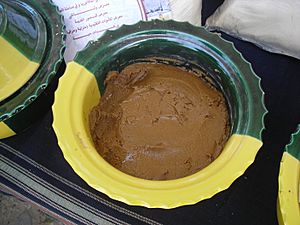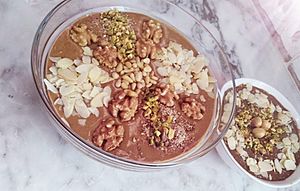Bsisa facts for kids
Bsisa (pronounced bee-SEE-sah) is a traditional and healthy food from the Mediterranean region. It's mainly made from flour of roasted barley. People have been eating Bsisa since the time of Ancient Rome!
Bsisa is actually a mix of different roasted grains, like barley or wheat. These grains are ground into a powder and mixed with yummy spices such as fenugreek, aniseed, cumin, and a little sugar. This special food is very popular in countries like Tunisia and Libya.
Bsisa has a long history. Long ago, travelers and nomads (people who moved from place to place) would carry Bsisa with them on their journeys. It was perfect for them because it was super nutritious and easy to carry as a powder.
What is Bsisa Made Of?
The exact spices and herbs in Bsisa can change from one recipe to another. It's a very flexible food!
How to Eat Bsisa
You can enjoy Bsisa in a few different ways:
- As a paste: The most common way to eat Bsisa is by mixing the powder with olive oil to make a thick paste. This paste is often eaten with dates or figs. It's a quick, healthy, and energy-packed meal!
- As a drink: You can also mix Bsisa powder with milk or water. This makes a flavorful drink called Rowina. It's a great way to get some quick energy.
- Howira: There's a similar mixture called 'Howira'. It's usually darker in color but uses many of the same ingredients as Bsisa.
Bsisa in Celebrations
Bsisa is more than just a meal; it's also an important part of cultural celebrations for many people in Tunisia and Libya, especially for Muslims and Jews.
The Nisan Celebration
One special occasion where Bsisa is eaten is on the first day of the Hebrew month of Nisan. This day is important because it marks when the Mishkan (a special portable temple) was first set up a very long time ago.
- Symbolic Ingredients: The Bsisa eaten on this day is sometimes called bsiset el-marquma. The wheat and barley in the Bsisa represent the mortar (the sticky material) used to build the Mishkan.
- Family Traditions: During this celebration, the mother of the family might place her gold ring into the Bsisa. This reminds everyone of the gold that was used to build the Mishkan.
- A Special Blessing: Before eating, the father of the family often says a blessing in Arabic. He mixes the Bsisa with oil using the key to their house. This act reminds people of the oil used in the Mishkan and symbolizes "opening" a new year or a new beginning.
The father and family take turns reciting a special blessing: Ya fetach, Bla Neftach, Arzekna warzek menna Ya atai, Bla mena!
This tradition highlights the rich history and cultural importance of Bsisa in these communities.



